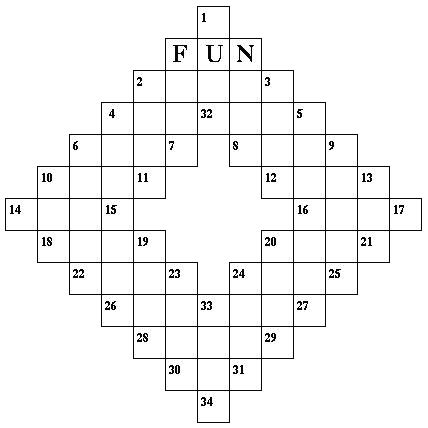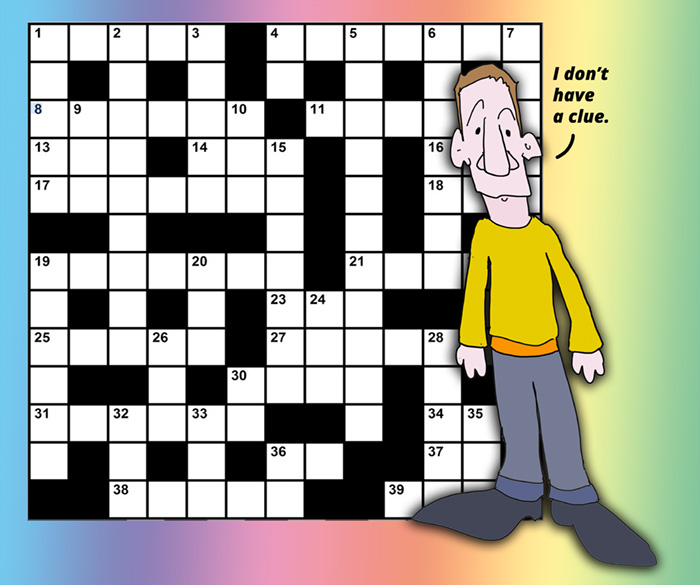I love a crossword puzzle. The real crossword puzzles, not to be confused with other word games, like seek-and-find, or those code-breaker things. Crosswords:
Clue: Four-across, five letters, “kind of cat.”
Answer: Tabby
Those kinds of crosswords. I get this from my dad. Every night, after all was said and done, when all the dishes were washed and put away, all the day’s chores complete, he would sit down in his Lay-Z-Boy and work the Dayton Daily News crossword. He’d always snack lightly on pretzel sticks or Cheez-Its. Sometimes he’d have a glass of wine or a beer. But one thing was certain. A sharpened pencil would be in one hand and the crossword in the other. He rarely asked for help.
So yes. I get this naturally. Or by osmosis.
I recall this about my dad because it was on this date, December 21, 1913, that the first crossword puzzle was published in New York World.
Crossword puzzles are said to be the most popular word game in the world. But surprisingly, they have a short history.
The first “versions” of crosswords appeared in England during the late 1800s. They were simple puzzles geared toward children. They’d show up sometimes in children’s magazines back then. I didn’t know kids had magazines in the late 1800s, but apparently so.
Anyway, here in the United States, the crossword puzzle developed into a serious adult game.
As mentioned, the first known published crossword puzzle was created by a journalist named Arthur Wynne from Liverpool. Wynne’s puzzle (included below) wasn’t quite like today’s crosswords. It was diamond shaped and contained no internal black squares.
At any rate. These puzzles caught on in the United States. During the early 1920s, many newspapers started picking up this new game. Within ten years, crossword puzzles were featured in almost all American newspapers.
My dad was born in 1922. So it was during his youth when crosswords became popular — back when he carried newspapers to help the family’s financial situation. I bet he worked them as a kid. I’d bet money on it.
What is the attraction? I think humans have a tendency to like solving the unknown. Every human likes to be right. That’s for sure. So these puzzles seem to be an affirmation of such, I think. It’s more than filling in the blanks. It is being given a clue and figuring out the mystery. Like Sherlock.
So there it is. My dad, the sleuth. Me, the sleuth.
Maybe you, the sleuth.
Such is life. When we are faced with a problem, we mostly have three choices. We can be a part of the problem. We can ignore it. Or, we can try to find a solution. It all depends on us. And, of course, it depends on the problem.
For instance, I didn’t care one bit that there was a Non-Traditional Oreo Flavors shortage during the pandemic. So I ignored that problem.
On the other hand, I cared very much that our roof started leaking a few years back. So I actively took part in finding a solution.
And finally, we Americans consume too much. But I like things like my good car and certain kinds of food. I like my house warm. And fortunately, I can afford these things. But in the grand scheme of conservation, these activities are all a part of the problem, and here I am.
So round we go. Our crosswords. Our problems.
Hopefully, we will do our best to be our best every chance we get.
Seven-across. Eight-letter word for consideration.
You guessed it. Kindness. And yes, you are full of it.
=====
“Every solution to every problem is simple. It’s the distance between the two where the mystery lies.”
― Derek Landy
=====
“It isn’t that they can’t see the solution. It is that they can’t see the problem.”
— Gilbert K. Chesterton
=====
“Just because we can’t find a solution it doesn’t mean that there isn’t one.”
— Andrew Wiles
======
By Arthur Wynne, December 21, 1913
from The New York World
2-3. What bargain hunters enjoy.
6-22. What we all should be.
4-5. A written acknowledgment.
4-26. A day dream.
6-7. Such and nothing more.
2-11. A talon.
10-11. A bird.
19-28. A pigeon.
14-15. Opposed to less.
F-7. Part of your head.
18-19. What this puzzle is.
23-30. A river in Russia.
22-23. An animal of prey.
1-32. To govern.
26-27. The close of a day.
33-34. An aromatic plant.
28-29. To elude.
N-8. A fist.
30-31. The plural of is.
24-31. To agree with.
8-9. To cultivate.
3-12. Part of a ship.
12-13. A bar of wood or iron.
20-29. One.
16-17. What artists learn to do.
5-27. Exchanging.
20-21. Fastened.
9-25. To sink in mud.
24-25. Found on the seashore.
3-21. A boy.
10-18. The fibre of the gomuti palm.
